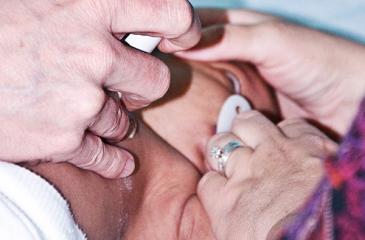Using Ultrasound to Assess Body Composition in Premature Infants in the NICU
Early body composition changes in preterm infants are associated with later neurodevelopmental and metabolic health. Tools to measure body composition in preterm infants are emerging, but each has their own set of limitations. Fortunately, ultrasound can be performed at the patient’s bedside, with minimal movement of the patient and without exposure to radiation, allowing for more frequent measurements regardless of medical stability. A current study led by Sara Ramel, MD, will assess whether ultrasound measurements are predictive of later metabolic and neurodevelopmental outcomes in premature infants, a population at risk for developmental delay, obesity, and metabolic disease. "We hypothesize that a better understanding of these relationships will lead to the incorporation of ultrasound into routine nutritional management of preterm infants and allow for future optimization of their overall health and development," said Ramel. Learn more about this study.



